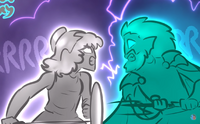| “ | In the Homeric Hymn to Aphrodite the singer goes out of their way to specify that Athena has no time for Aphrodite's shenanigans and instead of dealing with any kind of romantic shenaniganory, prefers to spend her time on the art of war, as well as the art of art in general. This trait of hers is so iconic and universally recognized that it contributes to her most famous epithet: Athena Parthenos, the virgin Athena. | „ |
| ~ Red on Athena's preferences. |
Athena (Ancient Greek Ἀθηνᾶ, Athēná), also known by the epithet Pallas (Ancient Greek Παλλάς, Pallás), is the Greek goddess of wisdom (which is a blanket for strategy, warfare, crafts and justice), a member of the 12 Olympians, and the patron deity of the city of Athens.
Her Roman equivalent is the goddess Minerva, and she has been compared to other deities like the Canaanite Anat, Egyptian Neith and Celtic Sulis.
Overview[]
Athena is the daughter of Zeus and Metis, and the older half-sister of Aphrodite (possibly), Persephone, Hephaestus, Ares, Apollo, Artemis, Hermes, and Dionysus. Thanks to her vast role in ancient Greek religion, Athena appears in many videos, usually helping various heroes such as Erichthonius, Bellerophon, Perseus, Heracles, Achilles, Diomedes and Odysseus achieve their goals.
Miscellaneous Myths[]
The Theogony[]

Athena springing fully-formed from Zeus' forehead
After Zeus defeated Cronus and became the king of the gods, he took Metis to wife, who had helped him defeat his father. She fell pregnant, but Gaia and Ouranos warned Zeus that Metis was fated to give birth to a son stronger than his father. Zeus, not desiring to be overthrown, consumed Metis. A remarriage, several affairs and children later, Zeus had a killing headache, and reacted by splitting his head open, leading to the birth a fully-grown, fully armed Athena from his head, the first of his esoteric births (the second would be Dionysus).
Pandora[]
Athena dresses up Pandora as soon as the latter is fully created.
Athens[]

Athena and Poseidon fighting over Cecropia (AKA future Athens)
One day, Athena came to Hephaestus to ask for weapons, but he, desiring her, chased after her instead. She ran away, so his seed fell on Gaia and thus the half-snake Erechtheus/Erichthonius was born, an early ruler/founding hero of Athens, whom she adopted and raised.
Another myth about the founding of Athens has Athena fighting with her uncle Poseidon over who wins patronage of the city, then called Cecropia. With the use of his trident, he gave a source of saltwater as a gift to the citizens, while Athena used her spear to grow an olive tree for their arid land. Versions vary on who decided, but all agree that it was Athena whom the people chose as their patron deity, naming their city after her.
Pride Tales[]

Aphrodite trying to find Athena a boyfriend
Athena appears in the Phoebus, Parthenos segment of the video. Unlike Apollo, who fell in love with both men and women, Athena is presented as being on the opposite end, having fallen in love with no one. She, along with Artemis and their aunt Hestia, are the three beings Aphrodite holds absolute no power over, thus her ‘Parthenos’ (“the maiden”) epithet.
Io[]
In the prologue of the video, Red explains that the episode of Athena transforming Medusa, a beautiful woman, into a hideous monster with snake for hair for having raped by Poseidon in one of her temples originates from Ovid's Metamorphoses.
Bellerophon[]
Athena helped Bellerophon tame Pegasus by appearing in his dream when he slept inside her temple. She dropped a golden bridle next to him and told him where to go to find the flying horse.
Perseus[]
The backstory involves Athena and Medusa. Later, afte Perseus had been sent to a suicide mission to kill Medusa, Athena and Hermes visited him to help him out by giving him some useful items. Athena gave Perseus a polished shield he could use as a mirror so he wouldn't have to look Medusa in the eyes and be petrified.
Dionysus[]

Athena holding the heart of Dionysus
In the Zagreus version of Dionysus’ origins, after the Titans had torn Zagreus apart, Athena saved his heart, which was later used to generate Dionysus.
The Minotaur[]
In some versions of the myth, her cousin Theseus was forced to leave her sleeping niece Ariadne on Naxos, with Athena being a candidate for the deity's identity sometimes.
Arachne[]
Athena was featured in Red's video about Arachne, an excellent weaver from Lydia. She became so conceited of her skill that she began claiming that it was greater than that of Athena, who gave Arachne a chance to redeem herself by assuming the form of an old woman and warning Arachne not to offend the gods. Arachne scoffed and wished for a weaving contest so she could prove her skill.

Arache and Athena weaving their tapestries
Athena wove the scene of her victory over Poseidon in the contest for the patronage of Athens. Athena's tapestry also depicted the twelve Olympian gods and defeat of mythological mortal figures who challenged their authority. In contrast, Arachne’s tapestry featured 21 episodes of the gods' sexual incidents, including Zeus being unfaithful to his sister-wife Hera with Danae, possibly Persephone, Europa, and Leda. It represented the unjust and discrediting behavior of the gods towards the mortals.
Athena admitted that Arachne’s work was flawless, but was outraged at Arachne’s offensive choice of subject, which displayed the failings and transgressions of the gods. Finally, losing her temper, Athena destroyed Arachne’s tapestry and loom, striking it with her shuttle. Athena then struck Arachne on the head with her weaving shuttle four times while yelling ‘WHAT. WERE. YOU. THINKING?” Arachne hanged herself in despair, but Athena took pity on her and brought her back from the dead in the form of a spider.
Aphrodite[]

The three goddess and the golden apple
At the wedding feast of Peleus and Thetis, Eris decided to spice up things by throwing a golden apple at the general direction of Athena, Aphrodite and Hera. The words to the fairest were engraved on this apple, and each of the three goddesses insisted she was the loveliest and thus, rightful owner of the apple. They stood before Zeus, asking him to be the judge; but Zeus, knowing there as no good answer to this particular question, sent the three of them to a young Trojan prince, Paris, to decide for him. The three goddesses appeared to him and demanded he choose the winner of the competition. To sweeten the decision, each offered him a bribe; Athena offered to make him the greatest battle strategist and warrior in the world, while Hera offered him the entire Asia and Europa as part of his kingdom. Nevertheless, Paris chose Aphrodite, who offered him the hand of the most beautiful woman in the world: their half-sister Helen, queen of Sparta. In the ensuing war between the Trojans and the Greeks, Athena would side with the Greeks for revenge.
Ares' Abduction[]
When Otus and Ephialtes attacked Olympus, Athena defended her home along with the other gods.
Classics Summarized[]
The Iliad[]
During the Trojan War, Athena and Hera sided with the Greek, while Ares and Aphrodite sided with the Trojans. At some point during the war, Diomedes, with Athena's help, wounded Aphrodite and Ares. who ran back to Olympus to complain to Zeus, only for Zeus to tell Ares to stop talking and call him a colossal disappointment. At some point later, despite Zeus' orders forbidding any god from interfering, Ares decided to join the battle anyway following the murder of his mortal son, only to be prevented by Athena.
The Odyssey[]
The Oresteia[]

Athena in court
In the third part of the Oresteia trilogy, Orestes arrived in Athens after being hunted down by the Furies for the murder of his mother Clytemnestra. Athena, deeming the situation too complex to judge for herself, assembled a jury of Athenian citizens, creating the judiciary system in the process. The Furies succeed in getting Orestes to confess that he did murder his mother. However, Orestes claimed that Clytemnestra had it coming and that she wasn’t really his parent; Apollo claimed that among mortals, only a father has any claim to parenthood, while the mother is only a fetus incubator who is not related to their children. While Red noted that this concept hasn’t aged well, it was nevertheless accepted by half of the jury. Athena mentioned that she would not condemn Orestes, so her vote was the tie-breaker. Orestes was acquitted and ran back home, while Athena invites the Furies to help her establish this new legal system she has just created. The Furies are thus dubbed ‘the Kindly Ones’ and now punish only the guilty party instead of delivering punishment with no regard for concept.
Physical appearance[]
Athena is gray-colored, much like Zeus. She always wears a long chiton and a Corinthian helmet on her hair, unlike Ares, who wears it in a way it conceals his face. When disguised as a mortal, her eyes remain grey.
In a more detailed drawing, her hair is painted dark blue.
Family Tree[]
|
|
|
|
|
|
|
|
| Gaia |
| Ouranos |
| |||||||||||||||||||||||||||||||||||||||||||||||||||||||||||||||||||||||||||||||||||||||||||||||||||||||
|
|
|
|
|
|
|
|
|
|
|
|
|
|
|
|
|
|
|
| ||||||||||||||||||||||||||||||||||||||||||||||||||||||||||||||||||||||||||||||||||||||||||||||||
|
|
|
|
|
|
| Cronus |
| Rhea |
|
|
| Aphrodite |
| |||||||||||||||||||||||||||||||||||||||||||||||||||||||||||||||||||||||||||||||||||||||||||||||||||||
|
|
|
|
|
|
|
|
|
|
|
|
|
|
|
|
|
|
|
|
|
|
|
| ||||||||||||||||||||||||||||||||||||||||||||||||||||||||||||||||||||||||||||||||||||||||||||
| Hera |
| Zeus |
| Hades |
| Poseidon |
| Hestia |
| Demeter |
|
| ||||||||||||||||||||||||||||||||||||||||||||||||||||||||||||||||||||||||||||||||||||||||||||||||||||||
|
|
|
|
|
|
|
|
|
|
|
|
|
|
|
|
|
|
|
|
|
|
|
| ||||||||||||||||||||||||||||||||||||||||||||||||||||||||||||||||||||||||||||||||||||||||||||
| Hephaestus |
| Ares |
| Metis |
|
|
| Leto |
| Maia |
| Semele |
| |||||||||||||||||||||||||||||||||||||||||||||||||||||||||||||||||||||||||||||||||||||||||||||||||||||
|
|
|
|
|
|
|
|
|
|
|
|
|
|
|
|
|
|
|
|
|
|
| |||||||||||||||||||||||||||||||||||||||||||||||||||||||||||||||||||||||||||||||||||||||||||||
|
|
|
|
| Athena |
| Apollo |
| Artemis |
| Hermes |
| Dionysus |
| |||||||||||||||||||||||||||||||||||||||||||||||||||||||||||||||||||||||||||||||||||||||||||||||||||||
Appearances[]
The Iliad
The Odyssey
The Orestia
Perseus
Bellerophon
Sisyphus Captures Death (cameo)
Heracles
Pandora
Dionysus
Arachne
Narcissus
The Theogony
Aphrodite
Io
Atlantis
Pride Tales
Ares' Abduction
The Minotaur
Athens
Actaeon (mentioned)
Aphrodite's Affair
The Trojan War
Quotes[]
| “ | Considering your audience is essential when creating any form of art | „ |
| “ | You better not be drawing dicks | „ |
| ~ Athena to spider!Arachne |
| “ | Forget what I said, kid! You're the best around! | „ |



